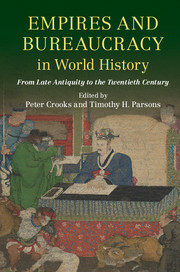Book contents
- Frontmatter
- Contents
- List of Figures
- List of Maps
- List of Tables
- List of Contributors
- Preface
- List of Abbreviations
- Part I Introduction
- 1 Empires, Bureaucracy and the Paradox of Power
- Part II Empires and Bureaucracy in World-Historical Perspective
- Part III From Late Antiquity to the Middle Ages
- Part IV From the Age of European Expansion to the End of Empires
- Part V Afterword
- Index
1 - Empires, Bureaucracy and the Paradox of Power
from Part I - Introduction
Published online by Cambridge University Press: 05 August 2016
- Frontmatter
- Contents
- List of Figures
- List of Maps
- List of Tables
- List of Contributors
- Preface
- List of Abbreviations
- Part I Introduction
- 1 Empires, Bureaucracy and the Paradox of Power
- Part II Empires and Bureaucracy in World-Historical Perspective
- Part III From Late Antiquity to the Middle Ages
- Part IV From the Age of European Expansion to the End of Empires
- Part V Afterword
- Index
Summary
Discernable across the flux of history is a persistent trend: the proclivity of human groups to establish large-scale and durable political formations that rule over subject populations of different ethnicities, religions and cultures – in short, to build empires. On this narrow point, scholars appear to have achieved consensus. But having gained power, usually through violent conquest, how did empires rule over different peoples across vast expanses of space and time? Or to recalibrate the question with the particular concerns of the present volume in mind: how did relatively small numbers of imperial bureaucrats govern large numbers of subordinated peoples? Dane Kennedy has aptly described this as ‘one of the most persistent conundrums to arise from the study of Western Imperialism’. Indeed, we can amplify his observation: this administrative sleight of hand is a conundrum of world history. It is also a matter with an urgent contemporary resonance. The past decade has witnessed a surge of work on the subject of empire inspired by what might be termed the ‘imperial turn’ in contemporary world affairs. Much of this literature swirls around a deceptively simple question: ‘what is an empire?’ Any satisfactory answer must take account of political structures and forms of governance – of how real empires actually ran. This book represents a collaborative effort to advance our understanding of these issues by exploring the power and limits of bureaucracy in historical empires across a broad canvas, from ancient Rome to the dismantling of European empires after World War II.
Such chronological and geographical scope, not to mention the range of disciplinary backgrounds and theoretical dispositions represented among our authors, is unusual in a book of this sort. It is quite deliberate. We explicitly reject the notion that an unbridgeable chasm separates historicist and generalist positions, ‘splitters’ and ‘lumpers’. Our methodological point of departure is that a diachronic approach to the history of empires is mutually enriching for all the sub-disciplines involved, and that it is possible to engage in long-range comparison while attending closely to geographical specificity, human agency and change over time.
- Type
- Chapter
- Information
- Empires and Bureaucracy in World HistoryFrom Late Antiquity to the Twentieth Century, pp. 3 - 28Publisher: Cambridge University PressPrint publication year: 2016
- 5
- Cited by



